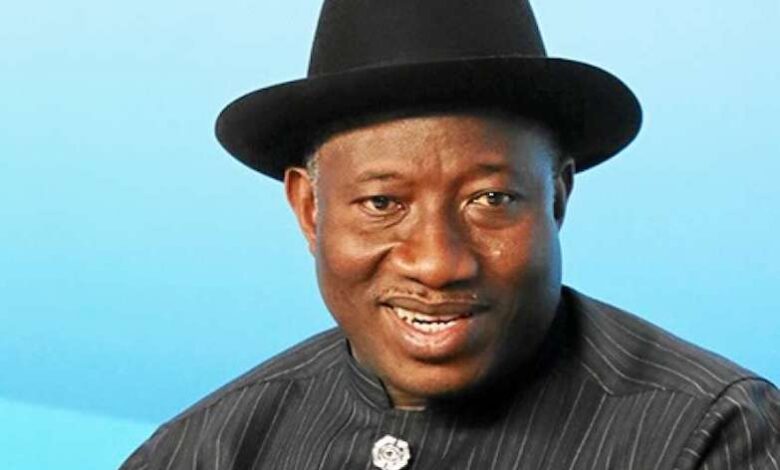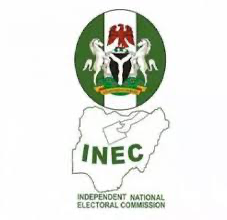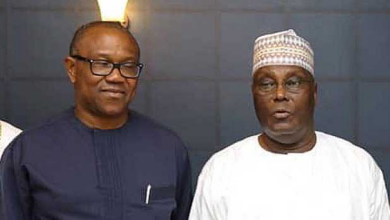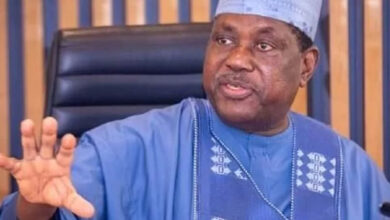Jonathan Warns Against Winner-Take-All Method Of Politics
Says avalanche of election petitions at every poll embarrassing President urges Nigerian leaders to recommit to values of inclusivity, accountability, transparency Says now is time to build nation where every voice is heard

Former President Goodluck Jonathan of Nigeria
Former President Goodluck Jonathan, yesterday, warned that the winner-take-all method of politics, which alienated other parties, no matter their performance at the polls, was averse to political justice and the goal of fostering unity in Nigeria.
Jonathan’s comments came as President Bola Tinubu advised Nigerian leaders to recommit to the values of inclusivity, accountability, and transparency to guarantee a democracy that flourished and endured for generations yet unborn.
According to thisdaylive.com, both leaders spoke at the 2024 Democracy Day Lecture held at State House, Abuja.
Speaking as chairman of the occasion at the national symposium held to mark this year’s Democracy Day, Jonathan advised the National Assembly to work out a formula that would enable political parties that scored a certain percentage of votes in an election to have some role in governance.
The ex-president observed that the present zero-sum practice in the country gave rise to do-or-die politics.
He stated, “Let me say that we need to come up with a model of democratic practice that will be more inclusive and reinforce social cohesion. The zero-sum kind of politics where a winner takes it all has not helped to foster unity and political justice.
“A political party that scores up to 30 per cent of the votes in an election at federal or states should not lose everything.
“We need to come up with innovative solutions that will address the challenge of political exclusion that usually comes up after elections.
“Zero-sum politics has over the years promoted desperation, agitations and disunity. We need to work out a model that guarantees political inclusion and promotes unity and tolerance in the polity.”
Jonathan explained, “I’m not clearly recommending proportional representation, but different governments come up with models of democracy that suit them.
“After all, the presidency we’re talking about, all presidents of the world don’t emerge through the same process. In Nigeria, we elect our president directly. In a number of countries, presidents are elected indirectly.”
The former president also said, “The powers of the presidents are defined by different constitutions, and so on and so forth.
“So our National Assembly can also look at models that will suit us. The zero sum where a party that even sometimes gets 40 per cent of votes, especially at the state levels, will have nothing, gives rise to this do-or-die politics.
“That zero sum approach, I think, is inimical to consolidating and strengthening our democracy.
“Let me conclude by saying that together, we can forge a Nigeria where every citizen has a voice, where opportunities abound, where the promise of a better tomorrow is not just a dream but a tangible reality.
“Let us, therefore, celebrate this milestone with pride and renewed determination.”
Jonathan advised the Tinubu administration to ensure that the politics of the next 25 years was transformative and inclusive, saying there must be a determined effort to dilute politics of region and religion.
He said, “Let us ensure that the next 25 years of our democracy are even more transformative and inclusive and more prosperous for all of us.
“In line with the wordings of our National Anthem, ‘To handover to our children a banner without stain,’ we must not handover to our children a democracy built on politics of region and religion.
“Democracy built on ethnicity does not endure. It will continue to wobble.”
Jonathan also urged Tinubu, who was represented by Vice President Kashim Shettima, to build more infrastructure for the country, and improve the quality of education and healthcare.
“But one key thing that for the next 25 years, you will midwife, because you are starting the next 25 years, is to build a democracy that will reduce friction,” the former president advised Tinubu.
Jonathan expressed concern over the amount of litigations that typically followed elections in the country, blaming it on parochial sentiments.
He said, “The avalanche of litigations that follow every round of election in Nigeria is very embarrassing. And it’s because of the kind of democracy we practise, democracy built on all kinds of sentiments, either the way you worship your God or from the map of the country you come from.
“You people have to gradually make sure that in the next 25 years, this is diluted if we must have a solid and enduring democracy.
“And I know you and the President Bola Ahmed Tinubu, who was a key actor in the June 12 crisis, will have the capacity to navigate through that process.
“I believe this programme and others commemorating this landmark will point the way to that glorious vision, and prepare the nation for a golden time centenary celebrations of enduring democracy.”
Jonathan welcomed the bourgeoning interest in the affairs of the country, especially among young Nigerians.
“Whenever I tune in to Nigerian TV stations, especially in the morning, and see young men and women discussing and interrogating contemporary political issues and holding leaders to account, I thank God for democracy and appreciate the gains we have made over the years,” he stated.
He added, “Today, citizens have come to terms with the idea of representative governance, as they have over the years expressed their power to choose their leaders and demand accountable leadership and good governance.”
In his remarks, Tinubu, who was represented by Shettima, said lessons learnt after 25 years was that democracy was a journey that must be constantly nurtured and watched closely.
According to him, “Our progress has been marked by both triumphs and trials, each serving as a reminder of the preciousness of our democratic principles. As we move forward, let us recommit to the values of inclusivity, accountability, and transparency, ensuring that our democracy not only endures but flourishes for generations to come.
“The future of Nigeria lies in our hands, in our ability to dream, innovate, and act with courage and conviction. Let us embrace this moment with a renewed sense of purpose, knowing that the path we tread today will shape the Nigeria of tomorrow.
“This is an invitation for each of us to participate in building a nation where every voice is heard, where every potential is realised, and where every citizen is empowered to contribute to the collective good.”
The president observed that for the country to have sustained democracy for 25 years, the longest in its chequered history, was evidence of “the enduring sacrifices of several generations of patriots”.
Tinubu declared that 25 years was enough time to ascertain the effectiveness of any experiment.
He said, “Our democratic experience, despite the lows and the highs, is a telling referendum on our aspiration to build a nation that serves the interests of all, a federation that has not conspired against any benign group.
“We are here because the alternative is a descent into dystopia. Today is a moment to reflect on our journey so far. The tragedies Nigeria survived to settle for this democracy, the fourth of such experiments, must inspire each of us to play our part to honour the labour of our founding fathers and mothers and remind ourselves of the principles that drove their resolve to build for us a diverse nation that has defied the pessimism of detached agents of anarchy.”
Noting that it was not just a day of remembrance, the president stated that the Democracy Day was a call to action. He said young and competent Nigerians, including the patriotic and innovative, must all be engaged in crafting a succession plan that would secure the desired future.
Speaking further, Shettima hailed Tinubu’s democratic credentials.
He stated, “Tinubu sacrificed his life, his time and resources for the enthronement of democracy in this country. This political enigma (Tinubu) had been caricatured, but our younger compatriots must be in the know of Tinubu’s memories from two decades past, when he was the fulcrum of opposition to the enthronement of one party dictatorship in this country.
“When his contemporaries were trading their principles for a place on the dinner table in Abuja and in the process throwing their allies under the bus, he provided courageously a political alternative to the ruling party.
“He was fiercely ostracised, politically ostracised and antagonised by the ruling PDP. By virtue of his commitment, his zeal and his resources and his belief in the rule of law, one by one, he retrieved the stolen mandates of Mimiko in Ondo, Rauf Aregnesola in Osun, Adams Oshiomhole in Edo, and he has remained a veritable sanctuary for the victims of political witch-hunt over the years.”
The vice president added, “When former Vice President, Atiku Abubakar, was harassed, intimidated, dehumanised and chased out of the PDP, it was to Bourdillion that he ran and it was the Lion of Bourdillion that gave him the political structure to contest for the presidency under the platform of the Action Congress.
“His choices of northerners to fly the flag of his party underlined his Pan-Nigerian credentials.
“Four years later, the same Bola Ahmed Tinubu provided the same political structure for another northerner, Mallam Nuhu Ribadu, to contest for the presidency of this country.”
Earlier, Secretary to the Government of the Federation (SGF), Senator George Akume, highlighted the sacrifices made by heroes and heroines who fought for democracy, with many paying the ultimate price.
Similarly speaking, former Governor of Katsina State, Hon. Aminu Masari, warned that Nigeria’s democracy was at a critical juncture, requiring urgent attention to address declining faith in the system, especially among the youth.
Giving the keynote speech, Masari emphasised the need for continuous attention to shifting perceptions of democracy among Nigerians, warning that complacency can undermine the system’s endurance.
The former governor also advocated a redefinition of local governance, citing constitutional confusion surrounding the status of local government areas.
He proposed allowing states to determine their administrative units based on resources and needs, rather than imposing uniformity across the country.
Masari made passionate appeals to politicians to prioritise citizens’ needs over personal interests and embrace democratic culture, acknowledging that democracy is slow and complex but remains the best form of government.





